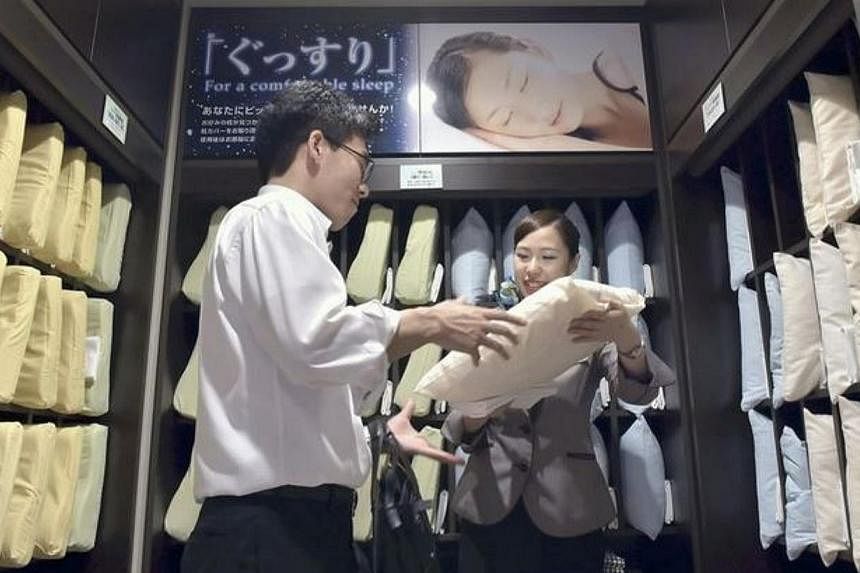TOKYO (THE YOMIURI SHIMBUN/ASIA NEWS NETWORK) - Most first-time customers at one of the 107 hotels nationwide operated by Japan hotel chain Super Hotel are surprised when, after checking in, they are taken to shelves full of pillows.
"Please choose whichever you like," says an employee of the hotel.
Guests can select a pillow from seven different types, including a soft polyester one to one stuffed with activated charcoal that offers a deodorising effect.
"I always stay at hotels run by Super Hotel whenever I go on domestic business trips because they always have the kind of pillow I like," said Mr Yusuke Kawamura, 31, a businessman who has stayed at the chain's Tokyo Station Hotel.
Using a good night's rest as a selling point, the company has made the walls of its rooms thicker than those of other hotels to reduce outside noise.
Super Hotel also has conducted joint research with universities on bedding. Though it will increase operating costs, the chain operator can keep prices down to 5,000 yen (S$58.90) per night by reducing other services drastically, said Mr Kensaku Yamamoto, an official of the company's hospitality management section.
According to Yano Economic Research Institute, the market size of the mattress and bedding industry, which includes futon and pillows, was 680 billion yen in 2013 and has been growing for four-straight years since 2010.
Mattresses with high-end features are the most competitive category of bedding goods. A wide selection of such premium products can be found on display at Tokyu Hands in Shibuya Ward, Tokyo.
"Many people want to get a good one, even if it's expensive," a Tokyu Hands employee said.
Mr Tetsuo Horikawa, 59, a restaurant worker, bought a mattress with a 70,000 yen price tag. "I spend most of my working hours standing, so I want (the bed) to help relieve my backache, even if it's just a little bit," he said.
Adequate firmness and support are said to be necessary for a good night's sleep. Material and build varies depending on the product.
"Many celebrities love our products," said an official of Airweave, a Tokyo-based mattress firm.
Nishikawa Sangyo said consumers have confidence in their brand. Both companies focus on image strategy in addition to product features and pricing.
Since 2010, major manufacturing firm Tanita has been selling a "sleeping scale", a device designed to measure the quality of sleep. The device comes in a flat, sheetlike form and is three centimeters thick. When fitted on a mattress, it can record the sleeper's pulse and breathing, and how many times they roll over in bed.
Sometimes you need to improve your lifestyle just before going to bed. For instance, looking at the brightly lit screen of a smartphone or drinking alcoholic beverages can lower the quality of your sleep.
An official of Tanita said many people, especially among the working-aged population, look to get quality sleep, even it's only for a short period of time.
Whether at home or on the road, everyone living in this stressful modern society hopes to get a good night's sleep, which means the bedding industry will continue to thrive.

